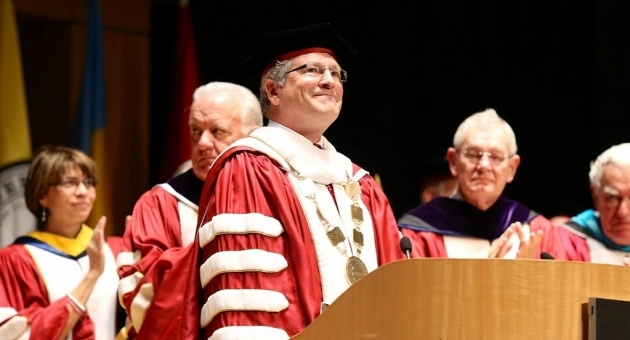President Theobald outlines vision for Temple University at inauguration
Tackling student debt first item on his agenda

Temple’s 10th president, Neil D. Theobald, laid out his vision to make the university more affordable, more entrepreneurial and more engaged with the city of Philadelphia. The president’s pioneering plan for the nearly 130-year-old university came during his inaugural address on Oct. 18.
Speaking to a packed house in the historic Baptist Temple, Theobald affirmed the university’s commitment to being diverse, international and excellent in teaching. He also announced a $50 million initiative for stronger research programs aimed at improving the lives of those in the city, the state and the nation.
Standing in the renovated building that was once the church of university founder Russell Conwell, Theobald recalled that Temple was created to help those who could not afford an education – a risky experiment at a time when college educations were primarily for the wealthy.
“Conwell's great experiment — at its core, an experiment in democracy — can only succeed if Temple University remains the place where the nation’s middle-class has access to a quality, affordable education,” said Theobald. “We must reinvigorate the Conwell legacy in order to create success in our students, our city, our Commonwealth and our nation.”
With Gov. Tom Corbett, City Council President Darrell Clarke, and the presidents of more than a dozen other local colleges and universities listening, Theobald characterized Temple as a leader on a new frontier, an urban landscape filled with opportunity and challenge.
He then laid out six commitments to ensure Temple’s success.
First, the university must focus on its students and their financial needs.
“Simply put, the most important problem facing higher education in America today is the level and distribution of student loan debt,” he said. “If we don’t immediately attack debt levels they will seriously limit the capacity of the next generation to establish its independence.
“Graduates with high debt put off buying homes. They delay getting married and having families. They lack mobility and become overly cautious in taking risks,” he explained.
Temple has taken decisive measures in recent years, bucking national trends, he said. For example, Temple kept base tuition increases to an average of 1.5 percent over the last two years. "Few universities can make that claim," the president said.
More help is on the way. Theobald said he will soon announce a pact with new students that “will be a guarantee of affordability and a model for higher education in the United States.”
In his second commitment, Theobald pledged to work tirelessly on behalf of the university’s faculty, whose quality teaching does not get the attention it deserves. “What our faculty need most is for the world to appreciate the extraordinary work they do,” he said
Third, the president pledged a more active engagement with the city of Philadelphia, proclaiming “Temple is Philadelphia’s public university.” He said there are strong links between the university and the city, noting that one of seven college graduates in the Philadelphia region is a Temple alumnus.
Theobald pledged to help Philadelphia with its most vexing problems by harnessing “the expertise, creativity and energy of our faculty, researchers and students in this cause.” The first issue to be broached is the funding problems facing the K-12 education in the city and the state.
The president’s fourth commitment was to enhance the university’s ability to conduct pioneering research. “We then must transfer these discoveries to the marketplace as never before,” which would enhance the city's economy, he said.
Theobald announced that Temple's board of trustees has backed this initiative by allocating $50 million over five years to boost the university's research enterprise.
“This investment will be used to attract faculty in promising areas, build new capacity and expand the impact of our scholarship,” he said. "The people of this city and this Commonwealth will lead better lives because of Temple's research."
Theobald’s fifth commitment was an articulation of what Temple’s student body should be: diverse and international.
“Living here on the urban frontier allows Temple to seamlessly embrace its commitment to the power of diversity,” he said. “Homogeneity is a death sentence in the modern world.”
The sixth and final commitment is to advance innovation and entrepreneurship across the entire university.
“Our students must learn to adapt to constant change and find success in fields that have not yet been invented," he said. Teaching entrepreneurship across all disciplines will help Temple students "feel empowered to take charge of their destinies."
He concluded by recounting his personal experience. Theobald was the first member of his middle-class family to get a college degree. That experience transformed his life, and put him on the path to Temple's presidency.
Theobald then urged the entire Temple community to join with him to "create a future full of promise on the new urban frontier."